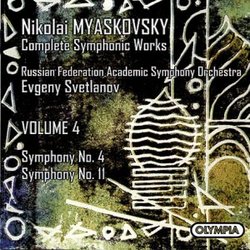| All Artists: Myaskovsky, Svetlanov Title: Myaskovsky: Complete Symphonic Works, Volume 4: Symphonies Nos. 4 & 11 Members Wishing: 0 Total Copies: 0 Label: Olympia Original Release Date: 1/1/2002 Re-Release Date: 6/25/2002 Genre: Classical Styles: Historical Periods, Modern, 20th, & 21st Century, Symphonies Number of Discs: 1 SwapaCD Credits: 1 UPCs: 5015524407346, 515524407346 |
Search - Myaskovsky, Svetlanov :: Myaskovsky: Complete Symphonic Works, Volume 4: Symphonies Nos. 4 & 11
 | Myaskovsky, Svetlanov Myaskovsky: Complete Symphonic Works, Volume 4: Symphonies Nos. 4 & 11 Genre: Classical
|
Larger Image |
CD Details |
CD ReviewsAn Important Series of an Important yet underrated Soviet IV David A. Hollingsworth | Washington, DC USA | 11/27/2002 (5 out of 5 stars) "The Fourth Symphony of 1918, completed after Myaskovsky returned home from the First World War (he was shell-shocked and somewhat disillusioned), in many ways takes over where the Third Symphony left off. But the score is in a sense in its own world. The andante section announced by the flute and then the supporting woodwinds is in many ways detached and ambiguous (recalling a bit of Stravinsky's Petrushka but almost as if a person is stranded in a perhaps pre-historic cold landscape and uncertain of his/her fate). The following passages is troubled, though not as turbulent as in the first movement of the Third Symphony. But the second movement is more better written. Its melodic profile is on an even keel; concentrated and cool, though at places mournful and disturbed, with an euphonious sense of compelling magic and flair. The woodwinds writing is tender and the strings (tremolo and muted) add to the captivation of this movement. It's quite a pity that the finale lacks that enduring quality of the second, which, despite is epic nature and the ending somewhat resounding, fails to come off more satisfying than it is. The Eleventh Symphony (1931-1932) is rather problematic also (namely his material that is more often histrionically juxtaposed than is truly developed). However, the coherence is rather more firmly in place than the Fourth and the memoriability is more apparent. The first movement is fairly well written; dramatic and energetic, though rather too melodramatic and not going very far than it should (given how enterprising Myaskovsky truly was). The second movement (andante) is quite a masterpiece. It's highly lyrical and noble, with a level of philosophical communication that is poetic and eloquent, and with the climax (@7:10-ff) which is compellingly Tchaikovskian in passion. The finale is robust and in places, dance-like and comical (not a typical Myaskovsky), although it is not as memorable as the finale of, say, his Sixteenth (which to me remains among his most successful of his symphonic oeuvre). Performances altogether are well done by Svetlanov and his Russian Federation Symphony Orchestra. However, for listeners just getting acquainted with the works of this composer, this disc would not be a very good place to start. Instead, start off with Volumes II, III, or VI (which consists of Myaskovsky's Sixth Symphony & the Pathetique Overture). Also, Jarvi's excellent recording of the Sixth is also available (courtesy of Deutsche Grammophon). However, for those more familiar with Myaskovsky, well.........."
|

 Track Listings (6) - Disc #1
Track Listings (6) - Disc #1